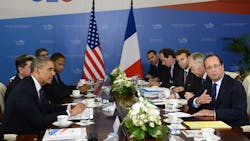G20 Warns Global Recovery 'Too Weak,' Shadowed by Risks
SAINT PETERSBURG - G20 leaders warned on Friday that global the economic recovery was too weak, with the risk of a further slowdown, and that some emerging markets showed particular fragility.
They backed a "Saint Petersburg action plan" to boost growth and employment as host Russian President Vladimir Putin cautioned that the "risks are still very, very large" for the fragile recovery.
Directly addressing concerns by emerging markets about the tapering of stimulus programs by central banks, the leaders vowed that future changes to monetary policy will be "carefully calibrated and clearly communicated."
"Despite our actions, the recovery is too weak, and risks remain tilted to the downside," the leaders said in their final communique after their two-day meeting in Saint Petersburg, which was overshadowed by the Syria crisis.
"Global growth prospects for 2013 have been marked down repeatedly over the last year, global rebalancing is incomplete, regional growth disparities remain wide, and unemployment, particularly among youth, remains unacceptably high," the statement said.
While there are signs of recovery in the eurozone and growth has continued in emerging market economies, it has slowed down in developing countries, it added.
The statement appeared to recognize the need for central banks such as the U.S. Federal Reserve to eventually end their monetary easing policies.
"We remain mindful of the risks and unintended negative side effects of extended periods of monetary easing," it said.
But it also added: "Our central banks have committed that future changes to monetary policy settings will continue to be carefully calibrated and clearly communicated."
The Saint Petersburg Action Plan
The "Saint Petersburg action plan" was aimed at stimulating growth and creating jobs, the statement said.
"There was a goal to create new quality jobs, with a special emphasis on stimulating employment of vulnerable groups, most of all youth, women, people with disabilities, and others," Putin said at his final news conference.
The countries agreed that they should also avoid "policies that could cause the recovery to falter or promote growth at other countries' expense."
The currencies of Brazil and India have been under serious pressure due to expectations that the US Fed will wind down its stimulus program while growth has been slowing even in China's powerhouse economy.
"The priority is growth and jobs. Sustainable growth and decent growth," said European Commission chief Jose Manuel Barroso.
"There is a growing consensus about what needs to be done," he said.
"Jobs are the key," added British Prime Minister David Cameron at a session on the labor market. "Jobs are what the citizens want to see," he added.
Putin said he shared the concern about the unwinding of stimulus programs like that of the U.S. Fed which had helped emerging markets to prosper.
"But such a policy of handing out free money, and we understand this well, cannot last forever," Putin said.
The U.S. stimulus freed up money that investors then ploughed into emerging markets and other riskier assets. But now the fear that this liquidity may recede is triggering major outflows.
The BRICS group of the world's leading emerging markets -- Brazil, Russia, India, China and South Africa -- at a mini summit ahead of the G20 urged the United States on Thursday to show caution.
French Finance Minister Pierre Moscovici told AFP that, on economic matters, the meeting had been more consensual than in the past.
He said that "what the G20 wants to create here are the conditions for a consistent recovery."
In their final communique, the G20 leaders also endorsed a drive drawn up by the Organization for Economic Cooperation and Development to impose uniform rules to crack down on tax avoidance by big multinationals and help fill repleted coffers.
– Stuart Williams, Maria Antonova, AFP
Copyright Agence France-Presse, 2013
About the Author
Agence France-Presse
Copyright Agence France-Presse, 2002-2025. AFP text, photos, graphics and logos shall not be reproduced, published, broadcast, rewritten for broadcast or publication or redistributed directly or indirectly in any medium. AFP shall not be held liable for any delays, inaccuracies, errors or omissions in any AFP content, or for any actions taken in consequence.
